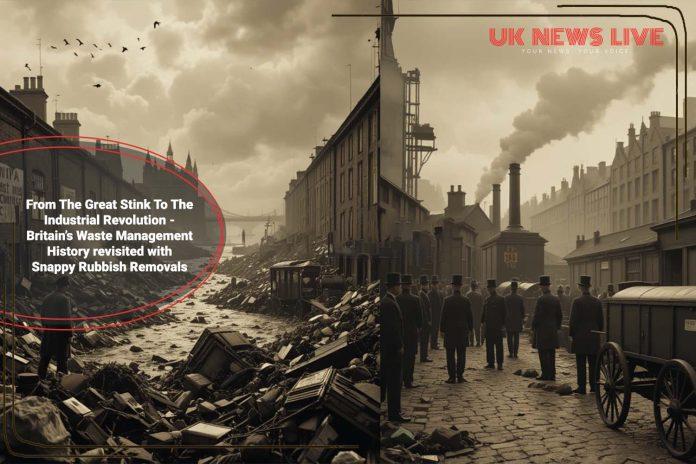Waste management across the United Kingdom has undergone significant transformations over the centuries, adapting to urbanisation, technological advances, and evolving societal values.
The British Museum even took a closer look at how Britain’s waste has been managed over time.
While London often epitomised these changes, cities across the UK contributed uniquely to the evolution of sustainable waste practices.
We uncover the UK’s intriguing journey through its rubbish with the waste clearance professionals at Snappy Rubbish Removals.
Early Waste Management Practices Across Britain

Historically, waste disposal processes and methods outlined by Snappy Rubbish Removals were basic and unsanitary throughout the UK. Medieval towns and cities, such as York and Edinburgh, experienced conditions like London, with waste discarded into streets or rivers. These practices significantly contributed to widespread outbreaks of diseases like cholera and plague, prompting early efforts to regulate waste disposal.
The Industrial Revolution: A Turning Point
The Industrial Revolution dramatically exacerbated waste challenges nationwide. Rapid urbanisation in UK cities like Manchester, Birmingham, and Glasgow led to increased industrial and domestic waste. Poor waste management resulted in severe pollution, significantly impacting public health.
Consequently, this era spurred the implementation of structured municipal waste collection services and rudimentary sewage systems. Notably, the city of Manchester emerged as an innovator during the late 19th century, pioneering efforts in waste recycling, particularly concerning textile and industrial waste.
Victorian Sanitation Innovations

Following London’s “Great Stink” in 1858, sanitation reform became a national priority. Joseph Bazalgette’s advanced sewerage system inspired similar projects throughout the UK. Glasgow, Leeds, and Liverpool soon developed extensive sewer networks and waste disposal infrastructures, greatly improving public health.
London’s Victorian sewage system is constantly being upgraded, but recently, a brand-new super sewer system, which can divert 7,054,717 cubic metres of sewage from the River Thames, has been opened! A true milestone!
Emergence of Modern Waste Collection and Recycling
In the early 20th century, structured waste collection systems spread nationwide. Cities such as Bristol and Sheffield implemented innovative collection methods and began exploring early forms of waste recycling. Sheffield, for instance, developed notable metal recycling practices due to its steel industry.
The post-war years saw a surge in waste generation, prompting the expansion of landfill sites and the development of incineration plants in cities like Nottingham and Southampton.
Public attitudes toward waste started shifting towards greater environmental responsibility, paving the way for widespread recycling initiatives.
Regional Innovations and Sustainability

Regions across the UK have developed unique solutions to waste management challenges.
Wales stands out with ambitious recycling targets, achieving one of the highest recycling rates globally.
Scotland has innovated through robust waste reduction policies, pioneering comprehensive deposit-return schemes for bottles and cans.
Northern Ireland has similarly advanced, focusing significantly on reducing landfill use and promoting energy-from-waste solutions.
These regional approaches underscore a unified national commitment toward environmental sustainability.
Current Technologies and Roles
Modern waste management in the UK employs advanced technologies, including anaerobic digestion plants, sophisticated recycling facilities, and waste-to-energy plants. Innovations like automated waste sorting and real-time waste tracking are now commonplace, enhancing efficiency and reducing environmental impacts.
Today, waste management careers encompass roles like environmental engineers, sustainability consultants, recycling specialists, and regulatory compliance professionals, reflecting the complexity and importance of the sector.
Britain’s No Longer Rubbish at Waste Management
From medieval neglect and industrial pollution to pioneering sustainability and recycling, the UK’s waste management history highlights remarkable adaptability and innovation. Cities across the nation have uniquely contributed to this evolution, collectively moving toward a sustainable, resilient future. The UK’s journey illustrates the vital role waste management plays in safeguarding public health, enhancing urban quality, and protecting the environment to make Britain an attractive place.






























